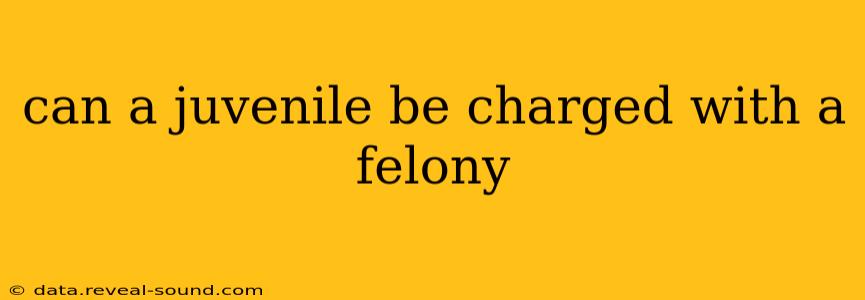Can a Juvenile Be Charged with a Felony?
Yes, a juvenile can be charged with a felony, although the process and consequences differ significantly from adult felony charges. The specifics depend heavily on the jurisdiction (state or country) and the severity of the crime. Understanding the nuances of juvenile justice is crucial to grasping the implications.
What is the Difference Between a Juvenile and Adult Felony Case?
The primary difference lies in the legal system used. Adult felony cases are handled in the adult criminal justice system, with potentially harsher penalties including lengthy prison sentences. Juvenile felony cases, however, are generally handled in a separate juvenile court system designed for rehabilitation and reform rather than solely punishment. This system prioritizes the child's best interests and potential for rehabilitation.
What Factors Determine How a Juvenile Felony Case is Handled?
Several factors influence how a juvenile felony case is processed:
- The Severity of the Crime: More serious felonies, like murder or aggravated assault, are more likely to result in stricter consequences, even within the juvenile justice system. This could include detention in a juvenile facility for an extended period.
- The Juvenile's Age and Criminal History: Younger juveniles are generally treated more leniently than older ones. A juvenile with a prior record faces more severe penalties than a first-time offender.
- State Laws: Each state has its own laws regarding juvenile justice, including the age at which a juvenile can be tried as an adult (often referred to as "transfer" or "waiver" to adult court). These laws vary significantly.
- The Juvenile's Circumstances: Factors such as the juvenile's home life, educational background, and mental health can influence the outcome of the case.
What are the Potential Consequences for a Juvenile Charged with a Felony?
Consequences can range widely, depending on the factors mentioned above:
- Probation: This involves supervision within the community and adherence to certain conditions.
- Detention in a Juvenile Facility: This is similar to prison but tailored to juveniles, focusing on rehabilitation and education.
- Restitution: The juvenile may be ordered to pay compensation to the victim for damages or losses.
- Community Service: This involves unpaid work for the community as part of rehabilitation.
- Treatment Programs: The juvenile may be required to participate in programs addressing substance abuse, mental health issues, or other contributing factors.
- Transfer to Adult Court: In some cases, a juvenile can be transferred to the adult criminal justice system to face felony charges as an adult. This typically happens with particularly serious crimes or repeat offenders.
At What Age Can a Juvenile Be Tried as an Adult?
The age at which a juvenile can be tried as an adult varies significantly by state. Some states have automatic transfer laws for certain crimes, regardless of the juvenile's age. Others allow for prosecutorial discretion or judicial waivers based on the circumstances of the case. There's no single national standard.
How Does the Juvenile Justice System Differ from the Adult Criminal Justice System?
The juvenile justice system is fundamentally different from the adult system in its philosophy and goals:
- Focus on Rehabilitation: The juvenile system aims to rehabilitate young offenders and reintegrate them into society, rather than simply punishing them.
- Confidentiality: Juvenile records are often sealed to protect the child's future opportunities.
- Emphasis on Due Process: While juveniles have rights similar to adults, the procedures in juvenile court may differ slightly.
- Different Penalties: The penalties in juvenile court are focused on rehabilitation, not necessarily retribution.
It's vital to remember that this information is for general knowledge and doesn't constitute legal advice. If you or someone you know faces a juvenile felony charge, consulting with a qualified legal professional is crucial to understanding the specific legal implications and rights within your jurisdiction.
